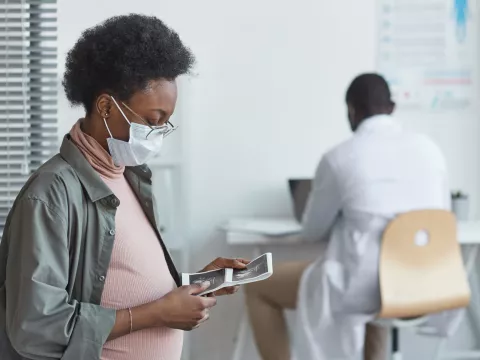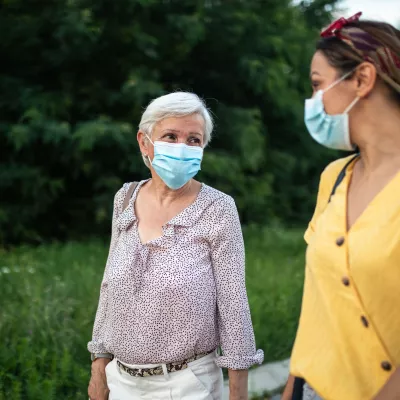- AdventHealth

If you’re growing your family, our trusted health care experts are here to answer your questions about COVID-19 vaccines before and during pregnancy and while you are breastfeeding.
Medical Director of Obstetrics and Gynecology at AdventHealth Medical Group, D. Ashley Hill, MD, and Michael Cacciatore, MD, an OB/GYN and a Chief Medical Officer for AdventHealth Medical Group, share what you should know if you are pregnant or breastfeeding and trying to decide whether to get the COVID-19 vaccine.
- Do COVID-19 vaccines cause infertility?
-
If you’re not yet pregnant but considering starting a family soon, this question may be on your mind. We’re here to clear the air on the misinformation and ease your mind, too.
Dr. Hill says that reports of COVID-19 vaccines causing infertility are false. “The vaccine has never been linked to infertility and there is no reason why it should cause any problems for women who want to have children.”
“There’s absolutely no evidence out there that suggests that COVID-19 vaccination is detrimental to fertility,” adds Dr. Cacciatore.
- If you've already been vaccinated, is it okay to get pregnant?
-
If you’ve already been vaccinated, you should be in the clear to begin the family planning process. The Centers for Disease Control and Prevention (CDC) says that women who are trying to become pregnant do not need to avoid pregnancy after receiving an mRNA COVID-19 vaccine.
- How dangerous is getting COVID-19 if you're pregnant?
-
“When you compare pregnant women with non-pregnant women, pregnant women have a higher chance of developing severe disease effects from COVID-19,” says Dr. Cacciatore.
“Pregnant women are also often more immune-compromised as compared to non-pregnant women, which increases their chances of worse outcomes with many diseases, including COVID-19.”
The severity of getting sick with COVID-19 during pregnancy can also depend on other factors, including preexisting or underlying health conditions. “Pregnant women with diabetes, high blood pressure, obesity, or other chronic medical conditions are more likely to be hospitalized or die from COVID-19,” says Dr. Hill.
Preterm Delivery Risk
“We also know that having COVID-19 while you’re pregnant increases the risk of preterm delivery,” Dr. Hill says.
“Preterm delivery is the most concerning factor we’re seeing, and it’s happening more often that we’re delivering babies sometimes 14 to 15 weeks early,” says Dr. Cacciatore. “When we deliver them that young, it poses a risk to the development of their brains, lungs, digestive tract — even their eyes.”
Need for ICU Support and Ventilation
The CDC has included pregnant women as part of the COVID-19 high-risk population, partly because pregnant women have an increased risk of ICU admission and the need for ventilation or support — something that’s becoming more common, lately. Dr. Cacciatore says he’s increasingly seeing cases of pregnant women, who are unvaccinated, “ getting COVID-19 and needing ICU care.”
“COVID-19 predominantly affects the respiratory system, and pregnant women are more susceptible to respiratory complications,” Dr. Cacciatore says. If the mother gets sick, her body likely can’t produce an adequate level of oxygen to support both herself and her baby.
Looking at all these factors together, “since pregnant women with COVID-19 infections are at an increased risk of preterm birth, intensive care unit admission or death, pregnant and breastfeeding women should be offered the COVID-19 vaccine,” Dr. Hill explains.
- Should you get the COVID-19 vaccine during pregnancy?
-
Two leading authorities on obstetric and gynecological medicine, the American College of Obstetricians and Gynecologists (ACOG) and the Society for Maternal Fetal Medicine, both say that COVID-19 vaccines should not be withheld from pregnant or breastfeeding women who want to be vaccinated.
No Evidence of Harm
“There is no evidence that the vaccine is harmful to women trying to get pregnant, who are now pregnant, or who plan to breastfeed,” says Dr. Hill.
Based on how the COVID-19 vaccines made with mRNA vaccines work, experts believe they are unlikely to pose a specific risk for people who are pregnant. “We don’t know the full effects of COVID-19 vaccination during pregnancy for pregnant women and their babies, yet, because pregnant women were not included in the initial vaccine trials for the mRNA COVID-19 vaccines,” Dr. Hill explains.
Studies Are Promising
However, the studies from March 2021 are promising. They show that these vaccines work to protect pregnant women from COVID-19 infection and “ there is some evidence that vaccination may provide some protection for your baby against COVID-19 infection for the first few months of life, similar to what we see for other vaccines used in pregnancy,” says Dr. Hill.
The Risks of COVID-19 Outweigh the Risks of the Vaccine
Whether you’re pregnant or not, you can’t get COVID-19 from the vaccines. “The mRNA vaccines from Moderna and Pfizer don’t contain live viruses, so neither you nor your baby can catch COVID-19 from these vaccines,” Dr. Hill says.
Most importantly, “the risk of an actual COVID-19 infection is far greater than any risk related to the vaccine,” Dr. Cacciatore says.
- If you're pregnant and want to get vaccinated, when should you get it?
-
Dr. Hill explains that you can get the COVID-19 vaccine at any point, both before conception and during your pregnancy, too. “There is no need to test for pregnancy before receiving the vaccine,” he says. And “if you get the first dose and then become pregnant, it’s OK to receive the second dose,” he adds.
Dr. Hill reminds women that the vaccine doesn’t offer complete protection against getting or spreading COVID-19. “It’s very important to follow CDC guidelines for wearing a mask, hand-washing and social distancing, even if you’re vaccinated,” Dr. Hill says.
- Can you get the COVID-19 vaccine if you're breastfeeding?
-
Breastfeeding women can get the vaccine, Dr. Hill says. “From what we know about mRNA, vaccines containing this material are not thought to be a risk to an infant who is breastfeeding. There is no biological mechanism for a vaccine to decrease breast milk production or the quality of the breast milk.”
Talk to Your Health Care Provider
Your health care provider can offer you personalized advice and guidance at every point in your pregnancy. Talking with them about your medical history, along with the risks and benefits of the vaccine, will help you make the most educated and informed decision for you and your baby.
“Every pregnant woman should consider her health and her risk for COVID-19 infection when deciding to get vaccinated,” Dr. Hill says. “There is no one right answer for everyone, and your trusted OB/GYN can help you make the best choice for you.”
Here to Help Guide Your Family
At AdventHealth, we’re dedicated to giving you information and updates you can trust on COVID-19, vaccines and more as you grow your family. Find resources for parents and read more vaccine-related FAQs for new moms on our Coronavirus Resource Hub.



